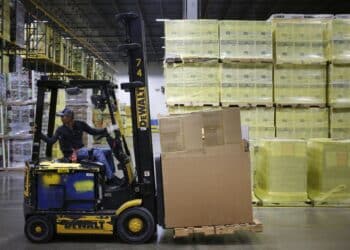Equipment companies are bundling products and services including maintenance and warranties to create turnkey solutions for customers.
A growing trend in the equipment industry is the shift to an “as-a-service” approach, with companies wanting one provider that can do everything, equipment leaders said during the Jan. 24 Equipment Finance Connect webinar.
“Clearly the whole industry is shifting to as-a-service, which starts by bundling the provision of the equipment with services,” said Joseph Pulicano, managing director of equipment finance at Accenture. “End users are looking for a bundled solution and a one-stop-shop approach, which allows you to understand the total cost of ownership of their assets and deal with one single provider, which basically provides everything — equipment, insurance, maintenance and any other services.”
Dublin-based Accenture, a global professional services company, reported revenues of $61.6 billion in fiscal year 2022, according to the company’s annual report.
Bundling mainly aids equipment companies from a procurement standpoint, Ben Speed, vice president at Johnson Capital Controls, said during the webinar.
“No longer are [equipment companies] procuring two types of transactions, but now they can procure one,” Speed said. “It also holds the vendor, if they’re providing any type of financing, accountable for things like warranties or service or maintenance. The idea of being able to get the full, turnkey solution is becoming popular.”
Milwaukee-based Johnson Controls Capital, the captive of Johnson Controls, has funded more than $6 billion in customer projects worldwide, according to the company’s website.
Benefiting businesses of all sizes
Small- and medium-sized businesses particularly benefit from the use of bundled solutions, Adam Little, senior manager of financial services consulting at Accenture, said during the webinar.
“You have a team that may be pulled in different directions; they may wear many different hats,” Little said. “A turnkey, bundled solution where you can get all of those transactions into one interaction with whoever you’re doing business with is hugely powerful.”
Large companies can also benefit from bundled services, Speed noted.
“Local managers are given control over their operating budgets, so it allows them to control their destiny. They’re going to procure something through a bundled-services solution as opposed to breaking it up into a CapEx request,” he said, noting that bundles could include services such as remote monitoring, performance verification, maintenance and extended warranties.
“The concept is really flexible and allows you to take whatever services that you’re buying and pair it with that asset — whether that’s physical, financial or digital,” Speed said. “This concept goes back to the software as a service, or SaaS, model, where you would have use of the product and then you would have licensing of that technology.”
SaaS is growing in the equipment industry, evidenced by Charlotte, N.C.-based SaaS firm Automation Intellect raising $997,000 in venture funding at the end of 2022 to improve industrial machine performance using data analytics, according to Crunchbase. Cloud-based networking solution provider Extreme Networks is also seeing growth, with revenue up 29% year over year to $115 million, according to the company’s Q2 2023 earnings call.
Companies are finding SaaS and other as-a-service systems allow them to better connect with customers, Pulicano said.
“One of the key aspects of moving to an as-a-service structure is the manufacturer gets in contact with the end user way more frequently, either directly or through the dealer,” he said. This allows manufacturers to understand how the assets are performing and “take proactive measures to improve the performance of their equipment.”









